Clarity of Responsibility, Accountability, and Corruption
Corruption is a significant problem for democracies throughout the world. Even the most democratic countries constantly face the threat of corruption and the consequences of it at the polls. Why are some governments more corrupt than others, even after considering cultural, social, and political characteristics? In Clarity of Responsibility, Accountability, and Corruption, the authors argue that clarity of responsibility is critical for reducing corruption in democracies. The authors provide a number of empirical tests of this argument, including a cross-national time-series statistical analysis to show that the higher the level of clarity the lower the perceived corruption levels. Using survey and experimental data, the authors show that clarity causes voters to punish incumbents for corruption. Preliminary tests further indicate that elites respond to these electoral incentives and are more likely to combat corruption when clarity is high.
- Derives a new theory of how clarity of responsibility affects corruption in both parliamentary and presidential democracies
- Empirically tests the theory with three novel and complementary approaches
- By expanding research on corruption in an approachable way, it should be of interest to a wide variety of readers
Reviews & endorsements
'Schwindt-Bayer and Tavits address an extremely important problem, political corruption, which has loomed large in the substantive politics of many countries and is widely recognized as impeding economic development and undermining democratic processes. Most political science work on causes of corruption has identified cultural and contextual factors that are difficult to alter in the short run. The authors argue, and demonstrate persuasively, that the level of clarity of responsibility in the political system, a feature responsive to change in legal and constitutional features (such as election laws and executive-legislative relations), is as important as the usual contextual factors in shaping corruption levels. This persuasive book, based on aggregate analyses, surveys, and an experiment, is very well written and accessible to the nontechnical reader, while still maintaining rigorous standards of high-quality research.' G. Bingham Powell, Marie C. Wilson and Joseph C. Wilson Professor of Political Science, University of Rochester, New York
'Based on both theory and empirical tests, Schwindt-Bayer and Tavits argue persuasively that clarity of political responsibility is the key to producing low levels of systemic corruption. The book is a welcome effort to bring together research on electoral politics with the literature on the causes of corruption across alternative political systems.' Susan Rose-Ackerman, Henry R. Luce Professor of Law and Political Science, Yale University, Conecticut
'In this superb book, Leslie A. Schwindt-Bayer and Margit Tavits make an important contribution to the literature on political corruption. They clearly and carefully delineate the micro-foundations of how political institutions affect political corruption, and they provide compelling supportive evidence using different levels of analysis. Clarity of Responsibility, Accountability, and Corruption expands the frontier of the literature and should be read by anyone who studies political institutions and political corruption.' Eric C. C. Chang, Michigan State University
'Schwindt-Bayer and Margit Tavits have produced an excellent book on the obviously-important topic of corruption. They have offered a powerful theory about how clarity of responsibility shapes the incentives for elites to pursue corrupt practices and voters to hold them accountable. They provide an accessible example of how researchers can use a multi-method approach to thoroughly test a new theory and to overcome data limitations. This book is a must read for anyone interested in the causes and consequences of corruption.' Guy D. Whitten, Texas A & M University
Product details
May 2017Paperback
9781107566927
218 pages
230 × 153 × 15 mm
0.34kg
33 b/w illus.
Available
Table of Contents
- 1. Introduction
- 2. A clarity of responsibility theory of corruption
- 3. A dataset of democracy and corruption
- 4. Clarity of responsibility and aggregate corruption perceptions
- 5. Corruption voting - a survey analysis
- 6. Corruption and accountability - an experimental analysis
- 7. The effect of clarity on elite efforts to combat corruption
- 8. Beyond anticorruption efforts - elite attention to corruption
- 9. Conclusions.






